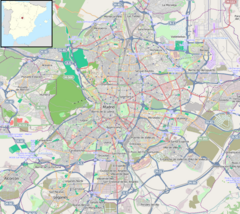Palacio Real
| Royal Palace of Madrid | |
|---|---|
| Palacio Real de Madrid | |

Royal Palace of Madrid
|
|
|
Location within Madrid
|
|
| General information | |
| Architectural style | Baroque, Classicism |
| Town or city | Madrid |
| Country | Spain |
| Coordinates | 40°25′05″N 3°42′51″W / 40.417974°N 3.714302°WCoordinates: 40°25′05″N 3°42′51″W / 40.417974°N 3.714302°W |
| Construction started | April 7, 1735 |
| Client | Philip V of Spain |
| Technical details | |
| Floor area | 135,000 m2 (1,450,000 sq ft) |
| Design and construction | |
| Architect | Filippo Juvarra (first of many) |
| Official name | Palacio Real de Madrid |
| Type | Non-movable |
| Criteria | Monument |
| Designated | 1931 |
| Reference no. | RI-51-0001061 |
The Royal Palace of Madrid (Spanish: Palacio Real de Madrid) is the official residence of the Spanish Royal Family at the city of Madrid, but it is only used for state ceremonies. King Felipe VI and the Royal Family do not reside in the palace, choosing instead the more modest Palacio de la Zarzuela on the outskirts of Madrid.
The palace is owned by the Spanish State and administered by the Patrimonio Nacional, a public agency of the Ministry of the Presidency. The palace is located on Calle de Bailén ("Bailén Street") in the western part of downtown Madrid, east of the Manzanares River, and is accessible from the Ópera metro station. Several rooms in the palace are regularly open to the public except during state functions. An admission fee of €11 is required. Some days it's free.
The palace is located on the site of a 9th-century Alcázar ("Muslim-era fortress"), near the town of Magerit, constructed as an outpost by Muhammad I of Córdoba and inherited after 1036 by the independent Moorish Taifa of Toledo. After Madrid fell to Alfonso VI of Castile in 1083, the edifice was only rarely used by the kings of Castile. In 1329, King Alfonso XI of Castile convened the cortes of Madrid for the first time. Philip II moved his court to Madrid in 1561.
The old Alcázar was built on the location in the 16th century. After it burned 24 December 1734, King Philip V ordered a new palace built on the same site. Construction spanned the years 1738 to 1755 and followed a Berniniesque design by Filippo Juvarra and Giovanni Battista Sacchetti in cooperation with Ventura Rodríguez, Francesco Sabatini, and Martín Sarmiento. Charles III first occupied the new palace in 1764.
...
Wikipedia

